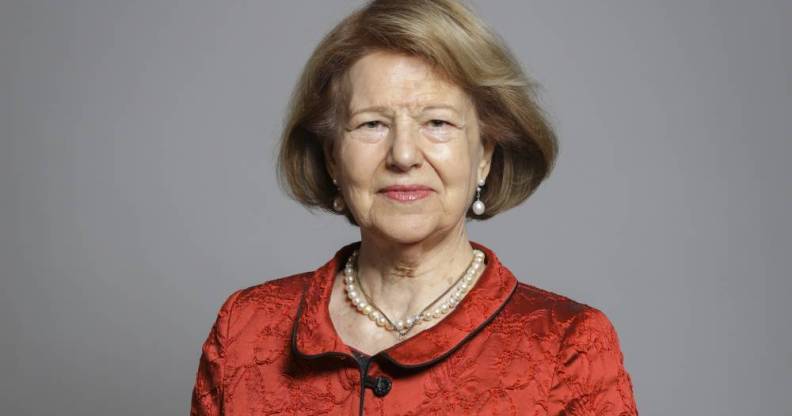Tory peer Baroness Nicholson thinks that it is ‘very dangerous’ for the BBC to tell children about pronouns

Baroness Nicholson. (UK Parliament, cropped. https://creativecommons.org/licenses/by/3.0/)
Anti-trans Tory peer Baroness Nicholson claims it’s “very dangerous” that the BBC explained what pronouns are to children.
On International Pronouns Day, BBC Bitesize – the public-service broadcaster’s free online study support resource for UK pupils – tweeted a cartoon of three teenagers in a changing room, each with their gender pronoun written underneath.
The tweet has now been deleted following a backlash from anti-trans campaigners, but according to the Daily Mail the accompanying text read: “For #InternationalPronounsDay, what are pronouns and how can you be an ally to friends who’ve changed theirs?”
According to the Merriam-Webster dictionary, a pronoun “is a word that is used instead of a noun or noun phrase”, with the most common pronouns being personal pronouns, which refer to people in the first, second or third person. Gendered pronouns, like she, he or the singular they, are often shared by trans people and allies in bios or email signatures to let people know how to refer to them.
Using the right pronouns for trans and non-binary people has a measurable impact on suicidality and mental health. A study earlier this year by suicide-prevention organisation The Trevor Project found that trans and non-binary youth who reported having their pronouns respected by all or most of the people in their lives attempted suicide at half the rate of those whose pronouns were not respected.
But Baroness Nicholson, who this year suggested that same-sex marriage had come at the expense of women’s rights and was later dropped by the Booker Prize amid a row about homophobia, transphobia and racism, took umbrage with BBC Bitesize for sharing the resource.
“I think the BBC is way out of line here and is putting itself in very dangerous territory,” she said. The Tory peer has yet to comment on BBC Bitesize’s resources about International Women’s Day, the CBBC Black History Month resource, or BBC News’ International Men’s Day explainer.
The “dangerous territory” is far from new, either – a cursory search shows that the BBC, which was branded “institutionally transphobic” by senior MP’s and LGBT+ advocates this year, published a detailed piece about the rise of the singular they pronoun back in 2015.
The Safe Schools Alliance, an anti-trans lobby group that this year pressured the CPS to drop guidance for schools on tackling anti-LGBT+ bullying and hate crimes, agreed with Nicholson.
“The BBC is promoting a damaging ideology to children. In so doing, they are breaching their own guidelines on editorial impartiality and the 1996 Education Act, which stipulates that an education provider cannot promote a political ideology to children – they can’t just push one side of an argument,” said Safe Schools Alliance spokesperson Tanya Carter.
A BBC spokesperson said: “We stand by the article and subject matter but recognise the image used to illustrate it was misjudged.”
Baroness Nicholson has been contacted for comment.

